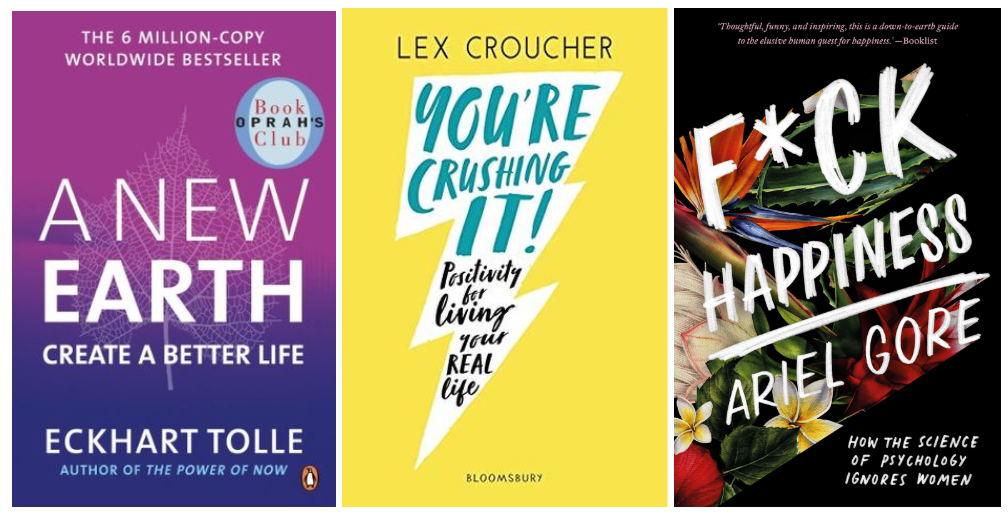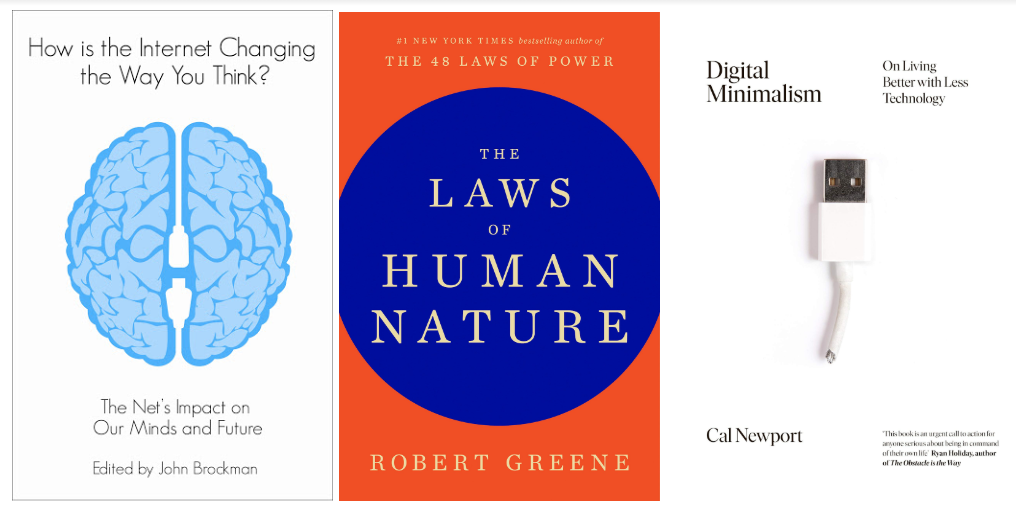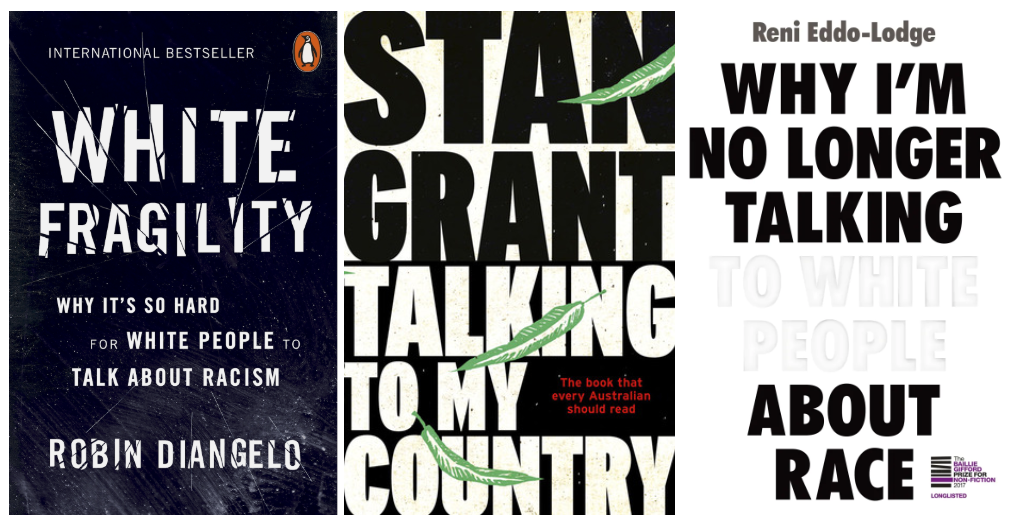14th September 2020
15 Social Science & Psychology Books to Feed Your Mind
Reading fiction & novels can be a great way to relax and unwind, but sometimes you also want books that will teach you something and feed your mind! Plenty of authors are writing engaging non-fiction (that reads NOTHING LIKE a dry textbook), and using their books to tackle a variety of social issues – from racism and feminism in our society, to how you can lead your best possible life. So if you are looking for some positivity and inspiration, or maybe you want to learn more about the inner workings of the ‘grey stuff’ in your brain, or maybe you’d really just like a survival guide to life…. then we have 15 recommendations for you!
A New Earth by Eckhart Tolle
Are you ready to change your life?In Eckhart Tolle’s ground-breaking book, he gives you the spiritual framework to:
- Understand yourself better
- Manage, manifest and achieve your goals
- Reach your full potential
- Channel conflict into something positive
- Change negative habits
- Live in the moment
Open your mind and follow Tolle’s guidance to happiness and health in the modern world.
You’re Crushing It: Positivity for living your REAL life by Lex Croucher
Sometimes life can be pretty amazing. But other times it feels like: A. Your heart and stomach have been steamrolled into a grisly organ pancake B. You are being put through an emotional spiralizer that creates human courgetti C. Both of the above. You’re a courgette pancake. No, Instagram filters won’t make it look any better. And, yes, we all feel this way.
An honest, thoughtful and hilarious survival guide for young people by social media sensation, Lex Croucher. Learn that you can face whatever today throws at you, because it has terrible aim anyway. And realise that only you scrutinise your flaws – seriously, no one else is paying attention, there’s far too much interesting stuff on Netflix. A must-read for anyone who wants to embrace their actual, real, unedited life. Just always remember … YOU’RE CRUSHING IT.
Lex Croucher’s frank and candid text is THE survival guide to help you make it through the crazy, topsy-turvy, whirlwind ride we call life. Brace yourself! Topics include: family and friends, body confidence, technology and social media, relationships, mental health, success and more.
F*ck Happiness: How the Science of Psychology Ignores Women by Ariel Gore
For readers of Rebecca Solnit’s Men Explain Things to Me and Barbara Ehrenreich’s Bright Side comes a provocative, persuasive look at how and why women’s desires are more complex than we are led to believe.
Happiness has become big business. Books, psychologists, consultants and even governments promote scientific findings into the psychology of happiness and how it can apply to the individual and to the broader society. The problem is that almost all of this science is performed by and for straight white men. And some of the most vocal of these experts suggest that women can become happier by adopting traditional gender values and eschewing feminism.
Sceptical of this hypothesis, Ariel Gore immersed herself in the optimism industrial complex, combing the research, reading the history, interviewing the thinkers, and exploring her own and her friends’ personal experiences and desires. F*ck Happiness is a nuanced, thoughtful and inspiring account of what happiness means and to whom, how it has played a role in defining modern gender roles and power structures, and how we can all pursue joy in our lives.
The Power Of Positive Thinking For Young People by Norman Vincent Peale
Aims to help young people to use the power of positive thinking to build successful lives. This book gets right to the heart of the most common problems faced by teenagers, and offers a series of practical steps for solving them. It provides young people with the positive approach needed to achieve the major goals in life.
Life Without Limits by Nick Vujicic
The life story of the amazingly gutsy Nick Vujicic, who despite being born without arms or legs has an unbelievably infectious zest for life and now travels the world as a highly successful motivational speaker.
The Happiness Trap: Stop Struggling, Start Living by Russ Harris
A guide to ACT-the revolutionary mindfulness-based program for reducing stress, overcoming fear, and finding fulfilment. Popular ideas about happiness are misleading, inaccurate, and directly contribute to the current epidemic of stress, anxiety & depression. In this empowering book Dr Harris provides the means to escape the happiness trap.
Blink: The Power of Thinking Without Thinking by Malcolm Gladwell
Intuition is not some magical property that arises unbidden from the depths of our mind. This book shows us how we can hone our instinctive ability to know in an instant, helping us to bring out the best in our thinking and become better decision-makers in our homes, offices and in everyday life.
Thinking, Fast and Slow by Daniel Kahneman
Looks at the way our minds work, and how we make decisions. This book reveals how our minds are tripped up by error and prejudice (even when we think we are being logical), and gives you practical techniques for slower, smarter thinking. It enables you to make better decisions at work, at home, and in everything you do.
Scatterbrain by Henning Beck
In this mind-bending book, award-winning neuroscientist Henning Beck explains why perfectionism is pointless – and argues that mistakes, missteps and flaws are the keys to success.
Remember that time you messed up simple maths or forgot the name of your favourite song? What if someone told you that our brain freezes are actually secret weapons, proof of our superiority to computers and AI? In Scatterbrain, we learn that boredom awakens the muse, distractions spark creativity and misjudging time creates valuable memories, among the many other benefits of our faulty minds. Combining cutting-edge science with brain-boosting advice and riveting real-life stories, Henning Beck takes us on a fascinating adventure through human memory (one that we’ll all remember differently!).
How is the Internet Changing the Way You Think? by John Brockman
The Internet, in the memorable words of EDGE founder John Brockman, is ‘the infinite oscillation of our collective consciousness interacting with itself. It’s not about computers. It’s not about what it means to be human – in fact, it challenges, renders trite, our cherished assumptions on that score. It is about thinking’. In How is the Internet Changing the Way you Think?, the latest volume in Brockman’s cutting-edge Edge questions series, 154 of the world’s leading intellectuals – scientists, artists and creative thinkers – explore exactly what it means to think in the new age of the Internet: from Nicholas Carr’s reflections on what the Internet is doing to our brains, to Richard Dawkins’s sanguine assessment of its long-term potential for good; and from Clay Shirky’s assessment of the impact of the Internet on the dissemination and sharing of knowledge, to Ian and Joel Gold’s observations on the seismic social changes it has brought about.
Editor John Brockman has assembled a world-class array of contributors, which includes (in addition to those mentioned above) Daniel C. Dennett, Martin Rees, Steven Pinker, Hans Ulrich Obrist, Sean Carroll, Brian Eno, Douglas Coupland, Matt Ridley, and scores of others at the epicentre of research in their respective disciplines.
The Laws of Human Nature by Robert Greene
From the million-copy bestselling author of The 48 Laws of Power Robert Greene is a master guide for millions of readers, distilling ancient wisdom and philosophy into essential texts for seekers of power, understanding and mastery. Now he turns to the most important subject of all – understanding people’s drives and motivations, even when they are unconscious of them themselves. We are social animals. Our very lives depend on our relationships with people. Knowing why people do what they do is the most important tool we can possess, without which our other talents can only take us so far. Drawing from the ideas and examples of Pericles, Queen Elizabeth I, Martin Luther King Jr, and many others, Greene teaches us how to detach ourselves from our own emotions and master self-control, how to develop the empathy that leads to insight, how to look behind people’s masks, and how to resist conformity to develop your singular sense of purpose. Whether at work, in relationships, or in shaping the world around you, The Laws of Human Nature offers brilliant tactics for success, self-improvement, and self-defence.
Digital Minimalism: Choosing a Focused Life in a Noisy World by Cal Newport
Learn how to switch off and find calm. Do you find yourself endlessly scrolling through social media or the news while your anxiety rises? Are you feeling frazzled after a long day of long video calls? In this timely book, professor Cal Newport shows us how to pair back digital distractions and live a more meaningful life with less technology. By following a ‘digital declutter’ process, you’ll learn to: u Rethink your relationship with social media u Prioritize ‘high bandwidth’ conversations over low quality text chains u Rediscover the pleasures of the offline world Take back control from your devices and find calm amongst the chaos with Digital Minimalism.
White Fragility: Why It’s So Hard for White People to Talk About Racism by Robin DiAngelo
Anger. Fear. Guilt. Denial. Silence. These are the ways in which ordinary white people react when it is pointed out to them that they have done or said something that has – unintentionally – caused racial offence or hurt. After, all, a racist is the worst thing a person can be, right? But these reactions only serve to silence people of colour, who cannot give honest feedback to ‘liberal’ white people lest they provoke a dangerous emotional reaction. Robin DiAngelo coined the term ‘White Fragility’ in 2011 to describe this process and is here to show us how it serves to uphold the system of white supremacy.
Using knowledge and insight gained over decades of running racial awareness workshops and working on this idea as a Professor of Whiteness Studies, she shows us how we can start having more honest conversations, listen to each other better and react to feedback with grace and humility. It is not enough to simply hold abstract progressive views and condemn the obvious racists on social media – change starts with us all at a practical, granular level, and it is time for all white people to take responsibility for relinquishing their own racial supremacy
Talking To My Country by Stan Grant
The acclaimed national bestseller – moving, passionate, deeply felt and powerful. In July 2015, as the debate over Adam Goodes being booed at AFL games raged and got ever more heated and ugly, Stan Grant wrote a short but powerful piece for The Guardian that went viral, not only in Australia but right around the world, shared over 100,000 times on social media. His was a personal, passionate and powerful response to racism in Australia and the sorrow, shame, anger and hardship of being an indigenous man. ‘We are the detritus of the brutality of the Australian frontier’, he wrote, ‘We remained a reminder of what was lost, what was taken, what was destroyed to scaffold the building of this nation’s prosperity.’
Stan Grant was lucky enough to find an escape route, making his way through education to become one of our leading journalists. He also spent many years outside Australia, working in Asia, the Middle East, Europe and Africa, a time that liberated him and gave him a unique perspective on Australia. This is his very personal meditation on what it means to be Australian, what it means to be indigenous, and what racism really means in this country. Talking to My Country is that rare and special book that talks to every Australian about their country — what it is, and what it could be. It is not just about race, or about indigenous people but all of us, our shared identity. Direct, honest and forthright, Stan is talking to us all. He might not have all the answers but he wants us to keep on asking the question: how can we be better
Why I’m No Longer Talking to White People About Race by Reni Eddo-Lodge
‘Every voice raised against racism chips away at its power. We can’t afford to stay silent. This book is an attempt to speak’ The book that sparked a national conversation. Exploring everything from eradicated black history to the inextricable link between class and race, Why I’m No Longer Talking to White People About Race is the essential handbook for anyone who wants to understand race relations in Britain today.






